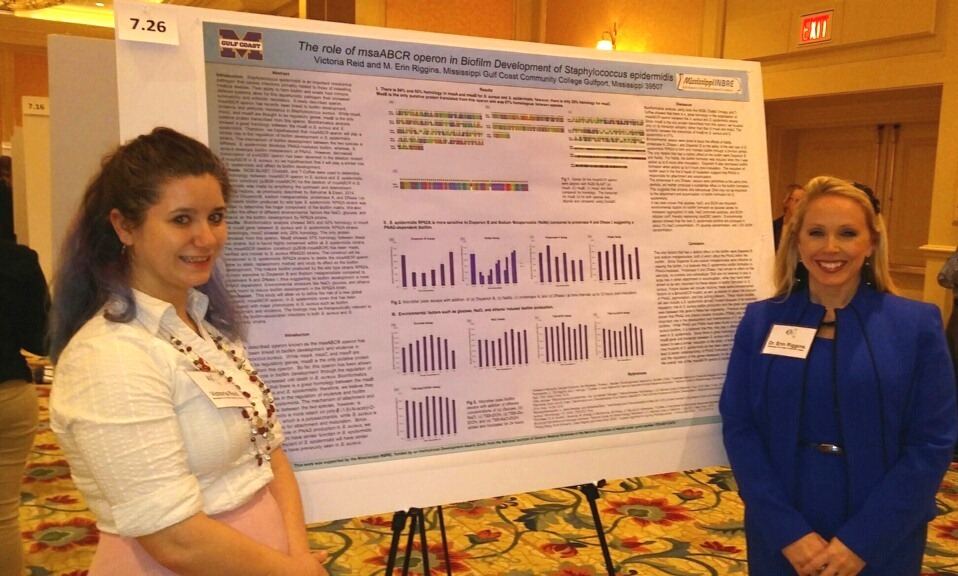Above: Victoria Reid (left), a student at Mississippi Gulf Coast Community College’s Jefferson Davis Campus, was invited to present a poster at the Southeast Regional Institutional Development Award (IDeA) meeting held in Biloxi earlier this month. Her presentation, “The Role of msaABCR operon in Biofilm Development in Staphylococcus epidermidis,” is the result of findings from the biomedical research class offered at MGCCC by Jefferson Davis Campus science instructor Dr. Erin Riggins (right) as part of the Mississippi IDeA Network of Biomedical Research Excellence (INBRE) program.
Five Mississippi Gulf Coast Community College students attended the 2015 Southeast Regional Institutional Development Award (IDeA) meeting held November 11-13 in Biloxi.
One student, Victoria Reid of Gulfport, was the only community college student invited to present at the event. She presented a poster entitled “The Role of msaABCR operon in Biofilm Development in Staphylococcus epidermidis.” Reid made the presentation to researchers from universities and other facilities from across the southeast region as well as to representatives of the National Institute of Health and National Institute of General Medical Sciences.
The other students attending the conference were Cotton Massengill, of Gulfport, and Katherine Lindgren, Jonathan Barrientos, and Michelle Everett, all of Biloxi. They are all participants in the same biomedical research program offered at the Jefferson Davis Campus.
“Not only was Victoria the only community college student to present, our group included the only community college students invited to attend the conference,” said Dr. Erin Riggins, science instructor at MGCCC¹s Jefferson Davis Campus. “In fact, the university researchers were surprised and impressed with the work our students have been doing at the freshman and sophomore level.”
Riggins leads a special biomedical research program, offered at the Jefferson Davis Campus, that is affiliated with Dr. Mohamed O. Elasri, a pathogenic microbiology researcher at The University of Southern Mississippi, through the Mississippi IDeA Network of Biomedical Research Excellence (INBRE) program. Students included in the voluntary, noncredit program must apply for acceptance.
“Being involved in biomedical research and attending and participating in scientific research conferences like this one is a wonderful opportunity for our students,” Riggins said. “Usually, freshmen and sophomore students are not given the opportunity to participate in this kind of thing, and at the university level, they usually only participate as seniors or graduate students. This certainly gives our students a head-start in their majors and will give them the opportunity to be accepted at universities with outstanding research programs.”
Mississippi INBRE is a network of colleges and universities throughout Mississippi designed to build a biomedical research infrastructure in Mississippi. Mississippi INBRE participants attend the Southeast Regional IDeA conference to present their findings. The conference includes individuals representing INBRE, Centers of Biomedical Research Excellence (COBRE), and IDeA Clinical and Translational Research programs from Arkansas, Kentucky, Louisiana, Mississippi, Puerto Rico, South Caroline and West Virginia. Representatives of the National Institute of Health and National Institute of General Medical Sciences were also at the meeting.

